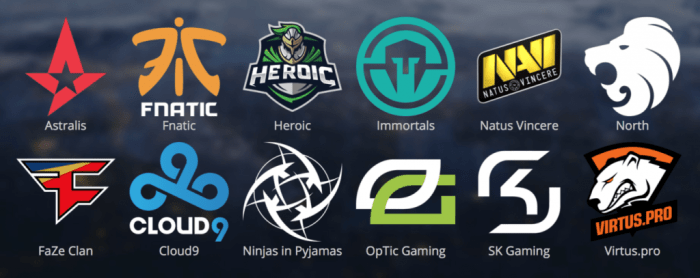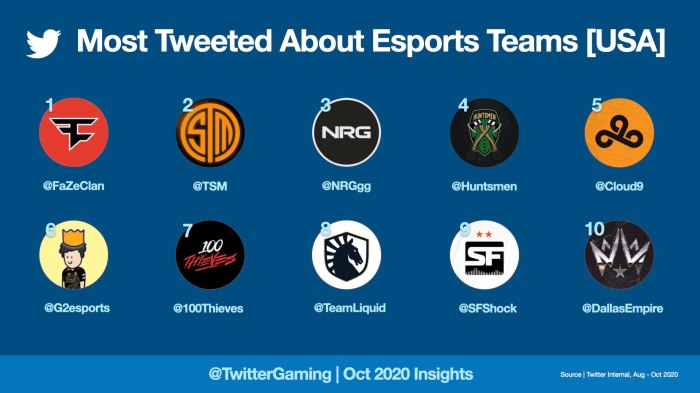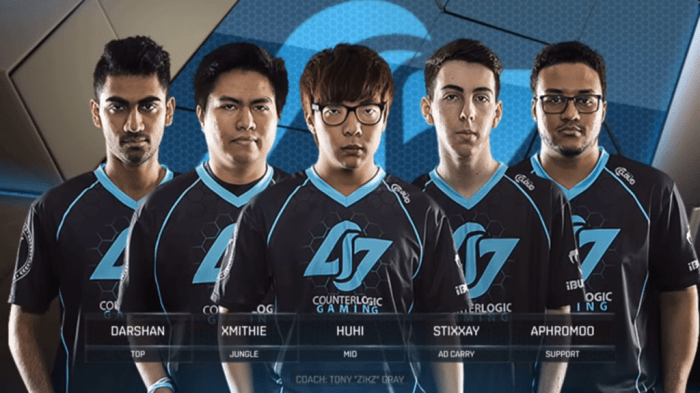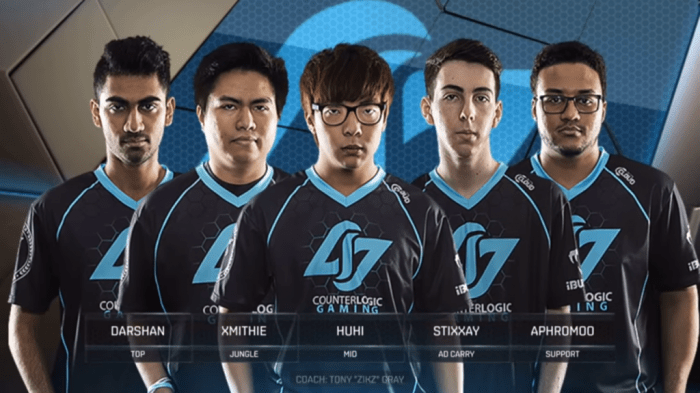Esports teams are more than just groups of gamers; they’re highly organized, competitive entities that mirror the structure and intensity of professional sports. From meticulous player recruitment and rigorous training regimens to sophisticated data analysis and savvy sponsorship deals, the world of competitive gaming is a dynamic and rapidly evolving industry. This exploration dives deep into the inner workings of these teams, uncovering the strategies, challenges, and future prospects that define their success.
We’ll examine everything from the hierarchical structures within teams – exploring the roles of players, coaches, managers, and analysts – to the crucial aspects of branding, fan engagement, and legal considerations. We’ll also look at how different games, like MOBAs and FPS titles, impact team organization and strategies, and how data analytics play a critical role in optimizing performance.
Get ready to level up your understanding of the esports landscape.
Esports Team Recruitment & Player Development

Landing a spot on a top-tier esports team is a highly competitive process, requiring a blend of raw talent, dedication, and the right support system. Successful teams don’t just find players; they cultivate them, investing heavily in both recruitment and development to ensure sustained success. This involves a multi-faceted approach that encompasses rigorous scouting, structured training, and personalized mentorship.Esports team recruitment is a sophisticated process, far beyond simply looking at K/D ratios.
It’s about identifying potential, understanding a player’s adaptability, and assessing their personality fit within the team dynamic. Top teams use a variety of methods, from analyzing online gameplay statistics and reviewing tournament performances to directly observing players in scrimmages and boot camps. The focus is not just on mechanical skill but also on strategic thinking, teamwork, and the ability to handle pressure.
Esports Team Scouting and Recruitment Processes
Successful esports team recruitment involves a multi-stage process. Initially, scouts actively monitor online leaderboards, tournament results, and community streams to identify promising players. This often involves using advanced analytics tools to quantify player performance across various metrics. Next, promising candidates are invited to participate in trials or scrimmages, allowing the team to assess their skills in a controlled environment and observe their teamwork and communication.
Finally, personality and compatibility tests, along with interviews, are used to determine whether the player will be a good fit for the team’s culture and dynamics. The entire process emphasizes a holistic evaluation, considering not only individual skill but also teamwork and adaptability.
Esports Player Training Regimes and Development Programs
Once a player is recruited, the focus shifts to development. This isn’t simply about more practice; it’s about structured, personalized training. Successful teams employ full-time coaches and analysts who create tailored training plans focusing on individual player weaknesses and team synergies. These plans may include individualized drills, strategic game analysis, mental conditioning exercises, and physical fitness programs.
For example, a coach might design specific aim-training exercises for a shooter game player or focus on map awareness for a MOBA player. Regular performance reviews and feedback sessions ensure continuous improvement and adaptation to evolving meta-game strategies.
Examples of Successful Player Development
Many esports teams have remarkable stories of player development. Consider the rise of a relatively unknown player who joined a team like Cloud9’s
- League of Legends* roster or Team Liquid’s
- Dota 2* team. Often these players demonstrate exceptional potential, but lacked the polish and strategic understanding of seasoned professionals. Through dedicated coaching, rigorous training regimens, and exposure to high-level competition, these players transformed into world-class competitors, demonstrating the effectiveness of well-structured development programs. The consistent feedback, personalized training, and support structure within these organizations were key to their success.
These examples highlight the power of investment in player development, transforming raw talent into championship-caliber players.
Esports Team Branding & Fan Engagement

Building a successful esports team requires more than just skilled players; it needs a compelling brand and a dedicated fanbase. A strong brand identity attracts sponsors, players, and most importantly, fans, creating a sustainable ecosystem for the team’s long-term success. Fan engagement is crucial for generating revenue, fostering community, and ultimately, winning. This section will explore a hypothetical branding strategy and effective fan engagement techniques.
Hypothetical Branding Strategy for a New Esports Team
Let’s imagine a new esports team focusing onValorant*. We’ll call them “Apex Predators.” Their brand will center around speed, precision, and strategic dominance. The logo could feature a stylized apex predator silhouette (perhaps a wolf or a falcon) incorporating sharp, angular lines to reflect the fast-paced nature of Valorant. The color scheme would be a combination of dark grey, electric blue, and crimson red – conveying power, precision, and aggression.
Marketing would focus on short, impactful video clips showcasing highlight reels of gameplay, emphasizing strategic decision-making and quick reflexes. Social media campaigns would leverage interactive content like polls and quizzes, building anticipation for matches and fostering a sense of community. We’d also utilize influencer marketing, partnering with popular Valorant streamers to promote the team and its players.
This multi-faceted approach would establish a strong brand identity and attract a loyal following.
Methods Used to Cultivate a Strong and Loyal Fanbase
Esports teams employ several strategies to cultivate loyal fans. Building a strong online presence through consistent, high-quality content is paramount. This includes regular updates on social media, engaging live streams, and behind-the-scenes content offering fans a glimpse into the team’s culture and personalities. Teams often create exclusive content for subscribers or members of their fan clubs, fostering a sense of belonging and rewarding loyalty.
Direct interaction with fans through Q&A sessions, social media contests, and meet-and-greets strengthens the bond between the team and its supporters. Successfully managing online communities and responding to fan feedback is crucial in building trust and loyalty. Furthermore, celebrating team achievements and milestones with fans through special events or giveaways creates lasting positive memories and strengthens the team-fan relationship.
Finally, consistently delivering high-quality performance on the competitive stage fuels fan enthusiasm and loyalty.
Strategies for Maintaining Fan Engagement Across Various Platforms, Esports teams
Maintaining fan engagement requires a consistent and multifaceted approach across different platforms. On social media (Twitter, Instagram, TikTok, etc.), teams can use engaging visuals, short-form videos, polls, Q&As, and behind-the-scenes content to keep fans informed and entertained. Live streaming on platforms like Twitch and YouTube provides opportunities for real-time interaction with fans, building community and fostering a sense of belonging.
Email marketing can be used to send out newsletters, updates, and exclusive content to subscribed fans. Teams can also leverage Discord servers to create dedicated spaces for fan interaction, discussion, and community building. Finally, utilizing a variety of content formats (videos, images, articles, etc.) caters to different preferences and keeps the content fresh and engaging. The key is to be consistent, responsive, and always provide value to the fanbase.
Esports Team Legal & Business Aspects: Esports Teams

Navigating the world of professional esports requires more than just killer gameplay; it demands a solid understanding of the legal and business landscape. From player contracts to intellectual property rights, a strong legal foundation is crucial for long-term success and avoiding costly mistakes. Similarly, a robust business plan is essential for attracting investors, securing sponsorships, and ensuring the team’s financial stability.Esports teams, like any business, face numerous challenges.
Understanding these hurdles and developing proactive strategies to mitigate risks is paramount for survival and growth in this dynamic industry. This section will delve into the key legal and business considerations for esports team management.
Contracts and Player Agreements
Professional esports teams rely heavily on player contracts. These legally binding documents Artikel the terms of employment, including salary, bonuses, performance metrics, and intellectual property rights. A well-drafted contract protects both the team and the player, preventing misunderstandings and disputes. Key clauses often include exclusivity rights (preventing players from competing for other teams), image rights (allowing the team to use the player’s likeness for marketing purposes), and termination clauses (specifying conditions under which the contract can be ended).
Failure to properly define these aspects can lead to significant legal battles and financial losses. For example, a poorly worded contract might leave a team vulnerable if a star player leaves for a rival organization. Thorough legal review by a specialist in sports and entertainment law is essential.
Intellectual Property Rights
Protecting intellectual property is crucial for esports teams. This includes trademarks (team logos, names, and slogans), copyrights (team-created content, such as videos and social media posts), and potentially patents (for innovative gaming technologies). Registering trademarks and copyrights provides legal protection against unauthorized use, ensuring the team’s brand identity and revenue streams are safeguarded. Teams might face infringement if another organization uses their branding without permission, leading to costly legal action.
A proactive approach to intellectual property protection is vital for maintaining brand value and securing long-term financial stability.
Business Strategies for Sustainability and Growth
Long-term sustainability requires a multifaceted business strategy. This includes diversifying revenue streams beyond player salaries, which might involve securing sponsorships from gaming companies or brands targeting the esports audience, exploring merchandise sales (jerseys, hats, etc.), and generating revenue from content creation (streaming, YouTube videos). Building a strong brand and engaging fan base is also key to attracting sponsors and increasing merchandise sales.
Successful teams often cultivate a loyal community through social media interaction, community events, and unique fan experiences. For example, Team Liquid’s consistent success and strong brand recognition have enabled them to secure lucrative sponsorships and establish a profitable merchandise business.
Challenges and Risks Faced by Esports Teams
Esports teams face a unique set of challenges. These include the volatility of player performance (star players may retire or underperform), the rapid evolution of the gaming landscape (new games and platforms emerge constantly), and the competitive nature of the industry (many teams are vying for the same sponsorships and players). Maintaining a strong financial position is crucial to navigate these challenges.
Financial risks include unexpected player departures, underperforming sponsorships, and the ever-present threat of economic downturns impacting sponsorship revenue. Teams must develop contingency plans to address these potential issues and ensure their long-term survival. For example, a sudden change in game popularity could severely impact a team heavily invested in a particular title. A well-structured business plan with diversified revenue streams can help mitigate these risks.
Quick FAQs
What are the typical salaries for esports players?
Salaries vary wildly depending on the game, team, skill level, and sponsorship deals. Some top players earn millions annually, while others receive smaller salaries supplemented by prize money and streaming revenue.
How do esports teams handle player burnout?
Teams employ various strategies, including scheduled breaks, mental health resources, and flexible training schedules to mitigate player burnout. Maintaining a healthy work-life balance is crucial for long-term success.
What are the common legal issues facing esports teams?
Common legal issues include player contracts, intellectual property rights, sponsorship agreements, and navigating international regulations for tournaments and player transfers.
How do esports teams choose which games to compete in?
Teams consider factors such as player skill sets, market potential, sponsorship opportunities, and the overall competitive landscape when deciding which games to focus on.
